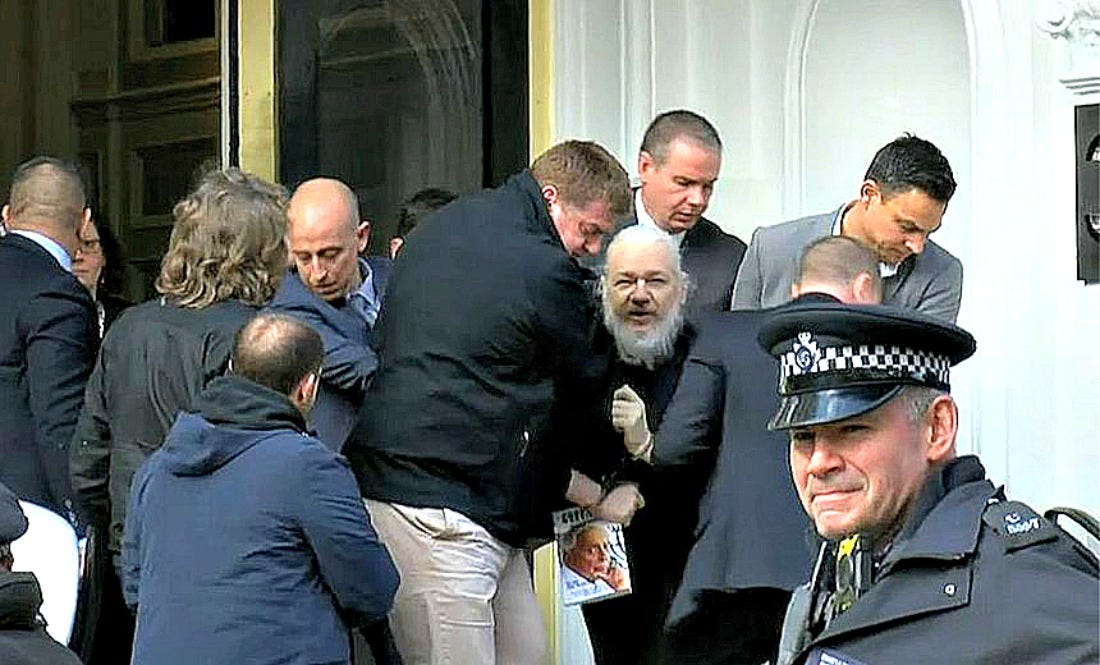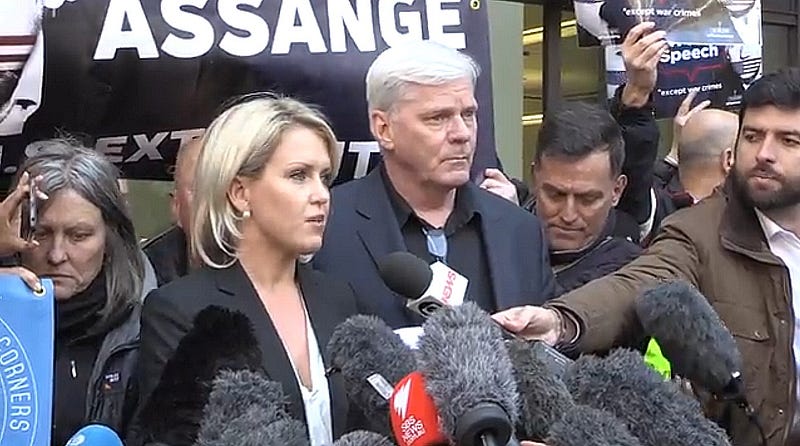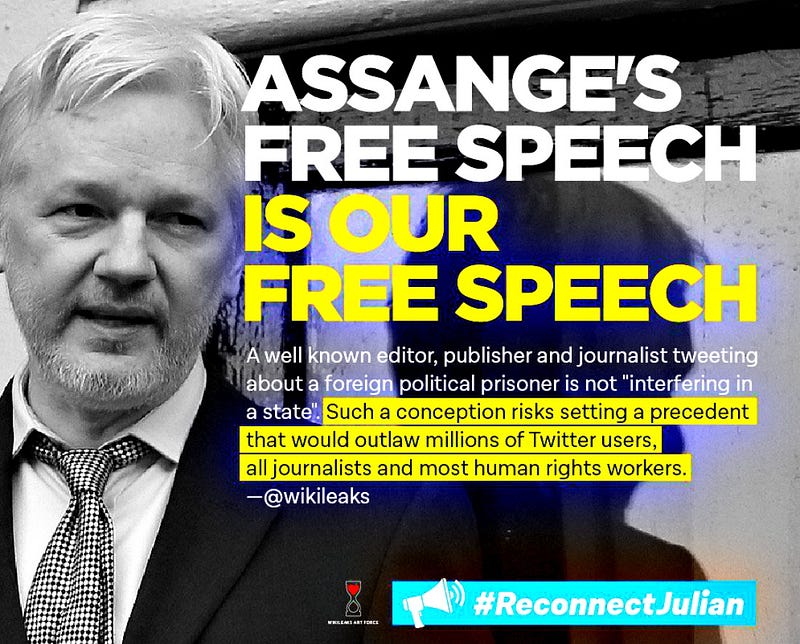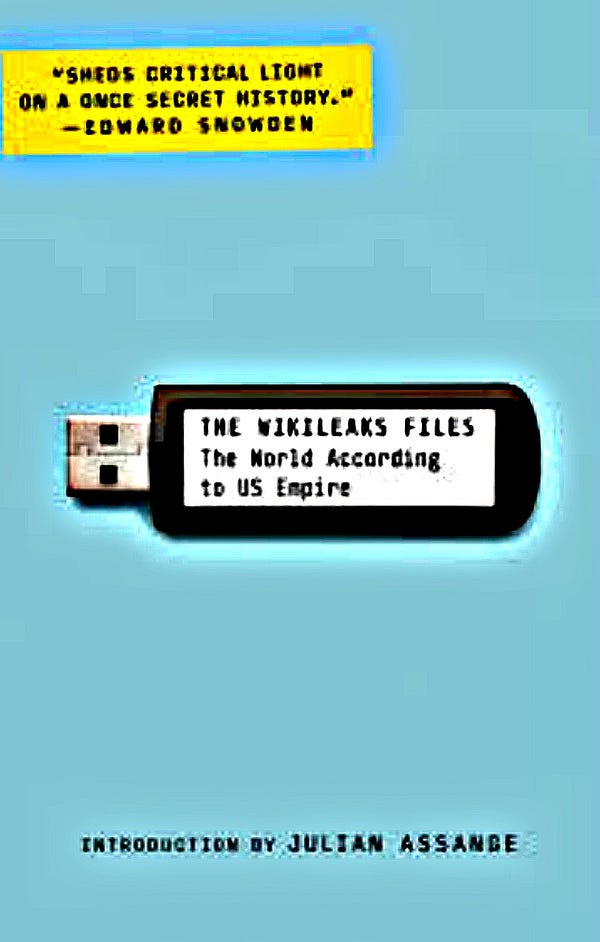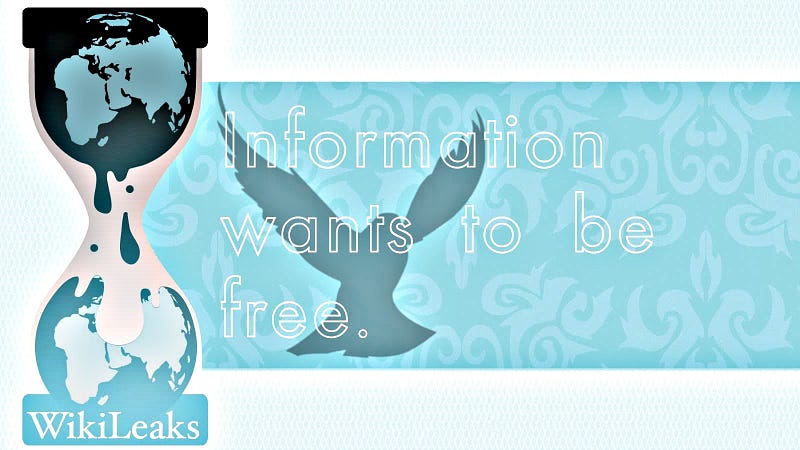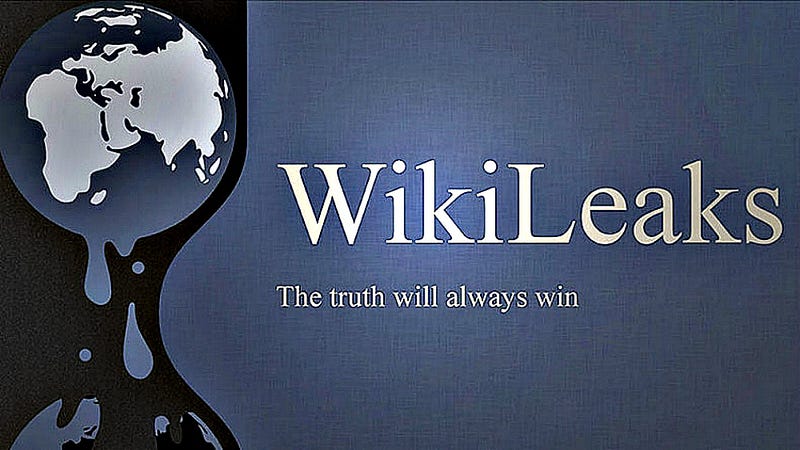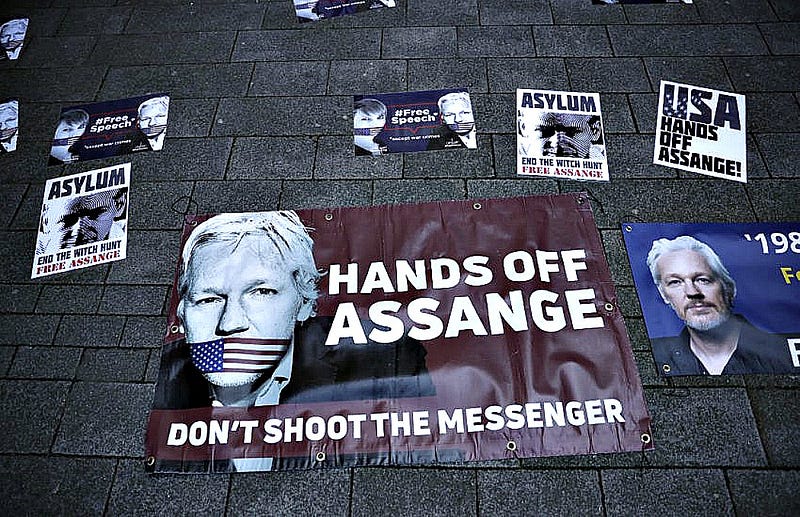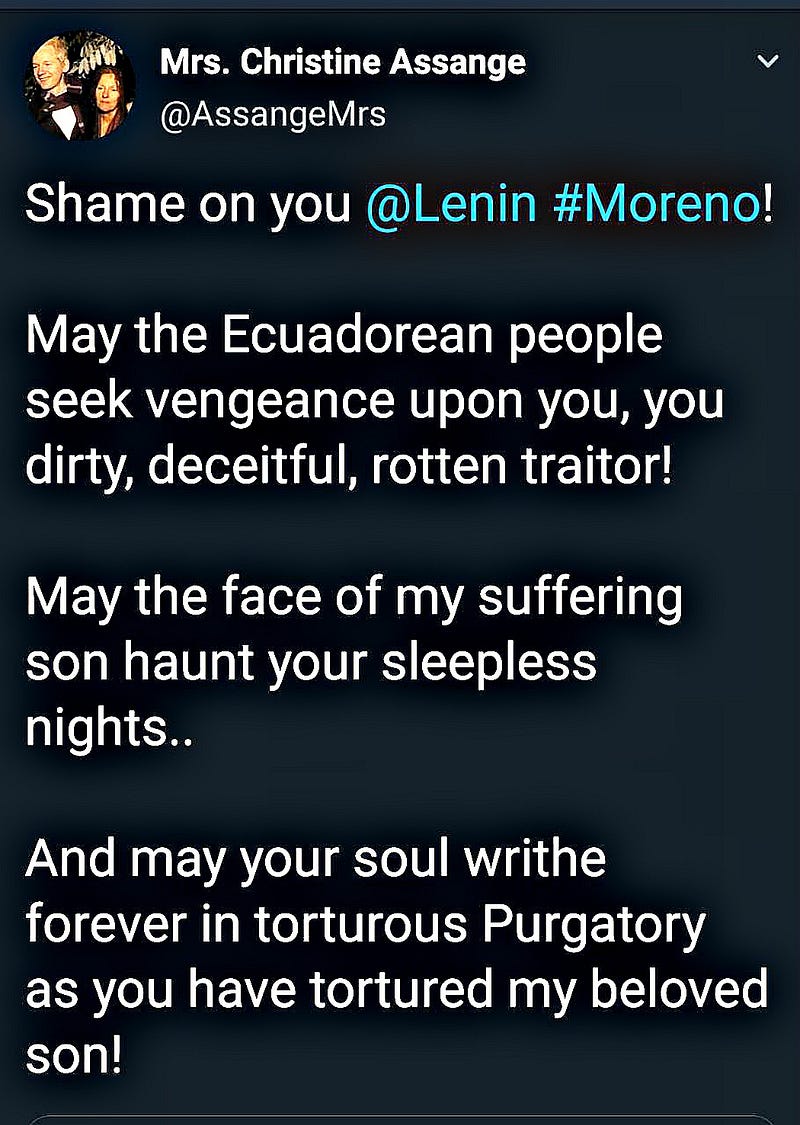Which master government strategists planned this?
With all their resources, money, power and operational capacities, who on Earth dreamed up the idea of making the intelligence community’s Number One nemesis front page news around the world?
And ensuring the story is dramatic enough that it will stay there in the coming months and years.
The sight of a disheveled Julian Assange, the most significant individual journalist, publisher and whistle blower of the 21st Century, being bundled into a police van in London has unleashed worldwide chest beating from the regressives and outrage amongst his many supporters.
In a time of universal deceit the truth is incendiary, and that is the fault line on which Assange lies.
The US government started what are widely deemed criminal, cruel and counterproductive wars in Iraq, Syria and Afghanistan.
Julian Assange exposed the perpetrators for the viciously incompetent self-interested apparatchiks they are.
Who really belongs in jail?
Dick Cheney or Julian Assange?
And they forget: Assange is well inside the top percentile of the most intelligent people on Earth. He’s already out gamed them before they’ve had breakfast.
He is not only far more intelligent than any single one of the politicians criticising him, he’s extremely idealistic, a dangerously unpredictable trait thrown into the ruins of entirely compromised Western democracies.
Assange also has a crack legal operative on his side, Jennifer Robinson, whose clients include CNN, Bloomberg News and The New York Times. Amongst her qualifications, a Master of Philosophy in International Public Law from the University of Oxford. Not to mention she presents extremely well on television.
Outside a British court she revealed that they had received a provisional extradition request from the US:
Since 2010 we’ve warned that Julian Assange would face prosecution and extradition to the United States for his publishing activities with Wikileaks. Unfortunately today we’ve been proven right.
This sets a dangerous precedent for all media organisations and journalists in Europe and elsewhere around the world.
This precedent means that any journalist can be extradited for prosecution in the United States for having published truthful information about the United States.
Who’s Fooling Who?
As late as December last year human rights experts at the United Nation’s Working Group on Arbitrary Detention repeated their calls for the UK to honour its international obligations and for Julian Assange to be released.
Their statement read in part:
States that are based upon and promote the rule of law do not like to be confronted with their own violations of the law, that is understandable.
Under international law, pre-trial detention must be only imposed in limited instances.
Mr. Assange should be able to exercise his right to freedom of movement in an unhindered manner, in accordance with the human rights conventions the UK has ratified The United Kingdom has ratified the International Covenant on Civil and Political Rights and has a responsibility to honour its commitment, by respecting its provisions in all cases.
Human rights treaty law is binding law, it is not discretionary law. It is not some passing fancy that a state can apply sometimes and not in the other.
Nobody saw this as fitting cover to resolve the issue; instead national security authorities in Britain, Australia and the US all locked themselves into their own arbitrary decisions. And ultimately made fools of themselves.
The UN group also commented that they were “further concerned that the modalities of the continued arbitrary deprivation of liberty of Mr. Assange is undermining his health, and may possible endanger his life given the disproportionate amount of anxiety and stress that such prolonged deprivation of liberty entails.”
The technology now available means you can be mentally tortured from afar. The man who helped exposed the widespread misuse of government surveillance was, it would most certainly appear, himself a subject of prolonged harassment.
The bedraggled state of Julian Assange as he was dragged from the Ecuadorian Embassy would confirm the worst fears.
Having ignored the United Nations condemnation of her illegal conduct, to cheers from the chimps in the British Parliament Prime Minister Theresa May welcomed Assange’s arrest, saying it showed that “no one is above the law”.
Except, of course, her.
Yes that’s the same execrable Theresa May increasingly described as the worst Prime Minister in UK history, the PM whose tortured Brexit negotiations have betrayed the entire weary nation.
Then there was US President Donald Trump. After previously declaring he loved WikiLeaks, this time around he says: “I know nothing about WikiLeaks. It’s not my thing.”
But if you really want to see Cretaceous toads plumbing the political depths, there’s nowhere like the Land Down Under, where the political hypocrisy over Assange has been entirely shameful.
You might well ask why one of the country’s most famous citizens did not take refuge inside the Australian embassy.
For the simple reason he was not safe there.
The weasel words of Australian politicians — up to their necks in a dangerous American alliance and with tens of billions of dollars of military contracts dancing in the background — began long ago.
Way back in 2010, even before he was forced to take refuge in the Ecuadorian Embassy, that hero of the Australian left, first female Prime Minister Julia Gillard, rushed to condemn Wikileaks and Julian Assange himself.
Ms Gillard was left red-faced when she could not explain to reporters exactly how Assange’s actions were illegal under Australian law.
The whistle blower himself promptly hit back in The Guardian newspaper:
I am an Australian citizen and I miss my country a great deal. However … the Australian Prime Minister, Julia Gillard, and the Attorney-General, Robert McClelland, have made it clear that not only is my return impossible but they are actively working to assist the United States government in its attacks on myself and our people.
Fast forward to the present, in the rapid churn of Australian Prime Ministers Scott Morrison currently holds the chalice.
Of Julian Assange’s arrest he said:
He won't be getting any special treatment from Australia, he'll be getting the same treatment that any other Australian would get.
When Australians travel overseas and the find themselves in difficulties with the law, they face the judicial systems of those countries.
It doesn't matter what particular crime it is that they're alleged to have committed, that's the way the system works.
In other words, screw you, the Australian government is going to do what it has always down, kowtow to the Americans and lift not a finger to help one of its own citizens.
In the UK Labour leader Jeremy Corbyn issued a statement:
The extradition of Julian Assange to the US for exposing evidence of atrocities in Iraq and Afghanistan should be opposed by the British government.
No such luck in Australia.
Opposition Labor leader Bill Shorten, shortly to be Prime Minister unless all the polls are wrong, said he had no view on Assange’s extradition to the US.
“I don’t know all the facts of the matter,” he said.
See. Absolute weasels.
Highly Principled Non-State Actor
Not one of his critics have achieved anything remotely like what Assange has done.
And the questions will begin soon enough: Why exactly is the US so keen to arrest one of the most influential figures of the 21st Century?
What exactly did he expose that did not deserve to be exposed?
Perhaps it was the indiscriminate or targeted extra-judicial killings in the name of terror, the deliberate geopolitical destabilization, the widespread malfeasance of the US Empire, the universal surveillance and abrogation of personal freedoms in the name of the war on terror? War crimes and human rights abuses? For exposing that Abu Ghraib was the tip of the iceberg, that America supported torture, that it deliberately fomented sectarian violence in Iraq, that it backed former Iraqi Prime Minister Nouri al-Maliki because he agreed to keep Iraqi oil fields open to the West?
Perhaps it was the links between Saudi Arabia’s funding of both the Islamic State and the Clinton Foundation.
Perhaps it was the organisation’s publicity breakthrough with the 2010 release of classified footage showing US troops shooting from Apaches helicopters at targets on the ground in Baghdad, most of them civilians. Two journalists were killed in the incident.
WikiLeaks has released a classified US military video depicting the indiscriminate slaying of over a dozen people in the Iraqi suburb of New Baghdad — including two Reuters news staff.
The infamous material was released in a package titled Collateral Murder.
The transcript read in part:
“Got a bunch of bodies lying here…”
“We’re shooting some more…”
“Hahaha I hit ‘em.”
“Nice.”
“Nice.”
“Good shoot’n.”
“Thank you.”
Of all the many achievements attached to the organisation, the 2015 publication of The Wikileak Files: The World According to US Empire ranks high among them.
In his introduction ‘Wikileaks and Empire’ Assange records that at the time of writing the organisation had published 2,325,961 diplomatic cables and other US State Department records, comprising some two billion words, the equivalent of some 30,000 volumes.
Assange writes:
The response of the United States to the release of the WikiLeaks materials betrays a belief that its power resides in a disparity of information: ever more knowledge for the empire, ever less for its subjects. Freed from their classified seals, the WikiLeaks materials bridge the gulf between the “morons” with security clearances and nothing to learn, and us, their readers.
Andrew Fowler, author of The Most Dangerous Man in the World: The Inside Story of Julian Assange and Wikileaks, told A Sense of Place Magazine there was worldwide interest in the Assange story.
Julian’s achievements are significant. As we learned from the Iraq War governments will fabricate information to fit their argument for war. What they will resist at all costs is the publication or broadcast of anything which reveals their acts of deception and falsehood.
The question about why some journalists dislike Julian Assange and often champion the increasingly intrusive level of state surveillance is intriguing.
As the media has been weakened by lack of funding it has found it easier to follow the government line than to ask questions. Stories can be ‘covered’ without too much effort.
Investigating the truth of what governments say about the necessity of increased surveillance and terrorism powers takes time, which many journalists simply don’t have.
Some journalists do not have ‘historical memory’ of events like the Iraq War, and are unquestioning. Others, such as those in parts of the Murdoch media, support militaristic answers to democratic problems. And others are simply too scared to question power.
Andrew Fowler said he was taken aback at how public Assange’s arrest was.
Assange was warning years ago this was going to happen. Nobody was listening to him. He was right. Infuriatingly, he often is.
If you wanted to get a metaphor about the state of the Western media, Assange’s arrest is it.
This was one of the biggest stories of the year, and they weren’t there. The only footage was from a Russian television station.
His detention, arrest and extradition is about issuing a direct warning to journalists that they should not do the kind of work that challenges authority and power at the highest level.
It’s OK turning over the local cops or the local hospital board, but not dealing with the leaders who shape the world we live in.
That he’s seen as a rebel shows the compliant nature of journalism today.
Mr Fowler said Assange should be seen as a normal journalist.
Journalism has become part of the establishment. It should be representing the people on the ground, not the big end of town.
When it comes to it, there is a great difference between people who are comfortable and those who are not. And in my view journalism has become far too comfortable.
Noam Chomsky
When news of the U.S. seeking to jail Julian Assange first emerged in 2017 the world’s most cited academic Noam Chomsky described the CIA’s targeting of the whistleblower as “a disgraceful act”.
In an Interview with Democracy Now he said:
WikiLeaks has released lots of information that governments don’t like. It’s overwhelmingly information that citizens should have. It’s information about what their governments are doing. And perfectly natural that systems of power don’t want to be exposed, so they’ll do what they can to prevent exposure. I think it’s a disgraceful act.
Chomsky says if the charges are true, of aiding and abetting Chelsea Manning and Edward Snowden, Assange should be honoured for it.
Chelsea Manning and Edward Snowden carried out heroic, courageous acts.
These are people who exposed it at great risk to themselves. So those are heroic, courageous acts. If WikiLeaks was abetting them, more power to them. That’s what they should be doing.
They fulfilled the responsibility of somebody who takes citizenship seriously — that is, who believes that the people of a country ought to know something about what their government is up to. OK? Like if their government is carrying out murderous, brutal attacks in Iraq, people should know about it.
The Truth Will Always Win
Thousands of news stories in dozens of languages have flowed across the world’s media landscape since Assange’s arrest on 11 April, 2019.
Helpfully, in a piece titled ‘The Affair Assange shows up what’s behind the curtain’, the editor of the Fabius Maximus website Larry Kummer has put together what he regards as some of the best analysis.
In his piece The Martyrdom of Julian Assange, Pulitzer prize winning journalist Chris Hedges writes:
The arrest of Julian Assange eviscerates all pretense of the rule of law and the rights of a free press.
The illegalities, embraced by the Ecuadorian, British and U.S. governments, in the seizure of Assange are ominous. They presage a world where the internal workings, abuses, corruption, lies and crimes, especially war crimes, carried out by corporate states and the global ruling elite will be masked from the public.
They presage a world where those with the courage and integrity to expose the misuse of power will be hunted down, tortured, subjected to sham trials and given lifetime prison terms in solitary confinement.
They presage an Orwellian dystopia where news is replaced with propaganda, trivia and entertainment. The arrest of Assange, I fear, marks the official beginning of the corporate totalitarianism that will define our lives.
Always Quote The Mother
There’s an old journalistic saying, always quote the mother.
Also true in the case of Julian Assange.
Apart from his high intellect, one of the most fascinating things about Assange is his very ordinariness; including his stuffed-up childhood as the son of a single mother.
As a boy, his family moved constantly from one place to another. He had lived in more than thirty Australian towns and cities by his mid-teens. In adulthood his lifestyle was also nomadic. He shifted through hotel after hotel with little more than a laptop and a change of clothes — while those who feared, despised and condemned him luxuriated inside their large houses and comfortable social circumstances.
Who will history see as the greater man? Those who pocketed their dividends from the manufacture of armaments, or one who exposed the worst conduct of the elites and the military in their bombing of Iraq and Afghanistan?
Julian’s mother Christine Ann Assange told an interviewer back in 2012 that as a child her son had wanted to be a physicist:
He wanted to discover the source of the universe. He has always been about the truth. He is not at all materialistic. He still has quite a limited wardrobe.
As a mother I wish he had never done it.
As a citizen, having investigated what Wiki Leaks has done, to bring transparency to the world about the abuses of power, of corruption, kidnapping, extortion, rorting and fraud involved with big institutions, I absolutely support my son.
In another interview Ms Assange said:
Without WikiLeaks we would never know how the power structure really works in the world. You can’t fix a suffering world without accurate and honest information. If WikiLeaks is destroyed it’s back to the dark ages.
We are working towards becoming a totalitarian state, 1984 is here. If you don’t fight it now then you will suffer under it. Julian is in the forefront of this — he’s the number one target at the moment and he’s the one we have to stand up for. I say this, not just as a mother, but as a citizen and someone who believes in democracy and freedom. We have to fight because if they take him, they can take anyone and they will take anyone.
Christine Assange is no more sanguine over recent events.

